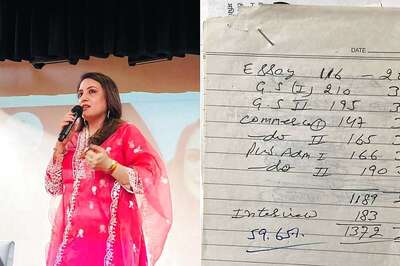
views
New Delhi: Over 480 COVID-19 patients have been administered convalescent plasma therapy at the Delhi government-run Lok Nayak Jai Prakash Narayan Hospital and Rajiv Gandhi Super Speciality Hospital over the last few months, officials said on Tuesday. LNJP Hospital and RGSSH are dedicated coronavirus facilities.
Plasma therapy was started at the LNJP Hospital, the largest under the Delhi government, in June. Later, Delhi’s second plasma bank was set up at the hospital in July. The national capital’s first plasma bank was inaugurated at the state-run Institute of Liver and Biliary Science (ILBS) on July 2 by Chief Minister Arvind Kejriwal.
The LNJP Hospital has 2,000 beds, of which 432 were occupied as on Monday. Of these, 258 patients are in the ICU, said Suresh Kumar, medical director of the hospital. “Till a couple of days ago, about 286 patients had received plasma therapy. Males outnumber females, and mostly people aged above 60 need it,” he told PTI.
Kumar said only serious patients whose condition is deteriorating are administered this therapy. Initially, people’s response to calls for donating convalescent plasma for COVID-19 patients in Delhi was “lukewarm”. Doctors had attributed it to apprehensions about associated health risks and the tendency to put off donation for any future need of family members in case they get infected.
However, with increased awareness and the situation getting somewhat better in terms of daily cases, the number of donors has risen, according to officials. “Each person can donate 250-500 ml of plasma. We give the first dosage of 250 ml to the recipient, and if needed, the second dosage of 250 ml after 24 hours,” Kumar said.
At RGSSH in east Delhi, over 200 patients have been administered the plasma therapy till date, its Medical Director B L Sherwal told PTI. “We have been combating COVID-19 for a long time now, and there have been several learnings too. The plasma therapy is a trial and it is administered with the assumption that it will help. Also, old and young both may need it depending on a patient’s condition,” he said.
RGSSH has 650 beds out of which 119 are occupied. Ninety-one patients are in the ICU and five of them on invasive ventilatory support, Sherwal said. “We have also created a place to cryogenically store donor plasma which we get from the ILBS,” he said.
For donors, people who have recently recovered from COVID-19 and developed antibodies, there are some strict criteria. Counselling and screening is done for them before the actual donation process begins. The process for each donor is completed within two to two-and-a-half hours. A donor’s antibodies are transferred to the recipient through plasma.
People in the age group of 18-60 who have fully recovered from COVID-19 and show no symptoms for 14 days can go for donation subject to strict guidelines for eligible donors. Someone weighing less than 50 kg, women who have ever been pregnant, cancer survivors, and those with kidney, heart, lung or liver diseases are not eligible to donate plasma.
Delhi has recorded 2,95,236 COVID-19 cases, while 5,581 people have succumbed to the disease so far, authorities said. The number of active cases in the national capital stands at 22,720, they said.
Disclaimer: This post has been auto-published from an agency feed without any modifications to the text and has not been reviewed by an editor




















Comments
0 comment